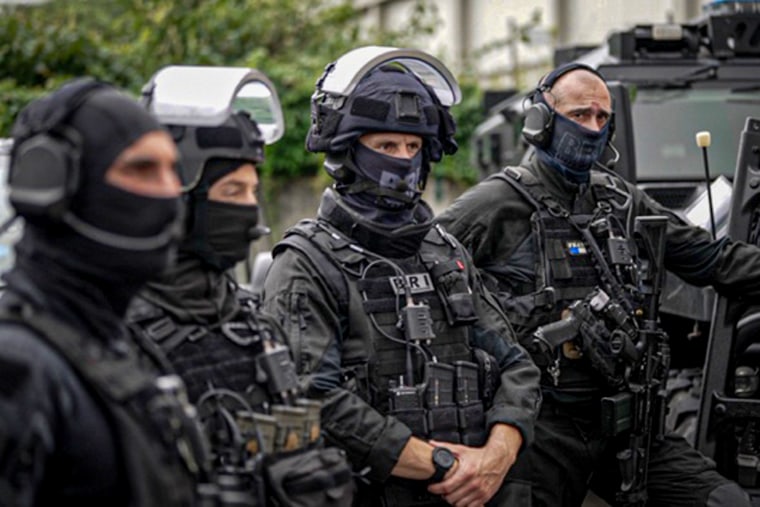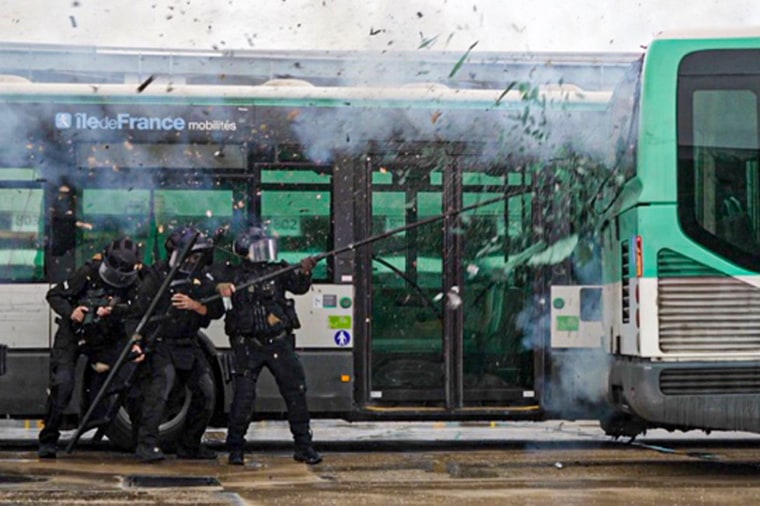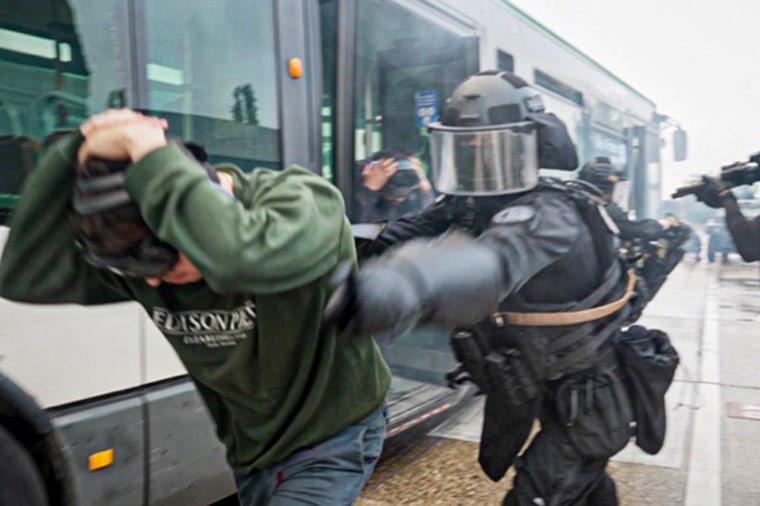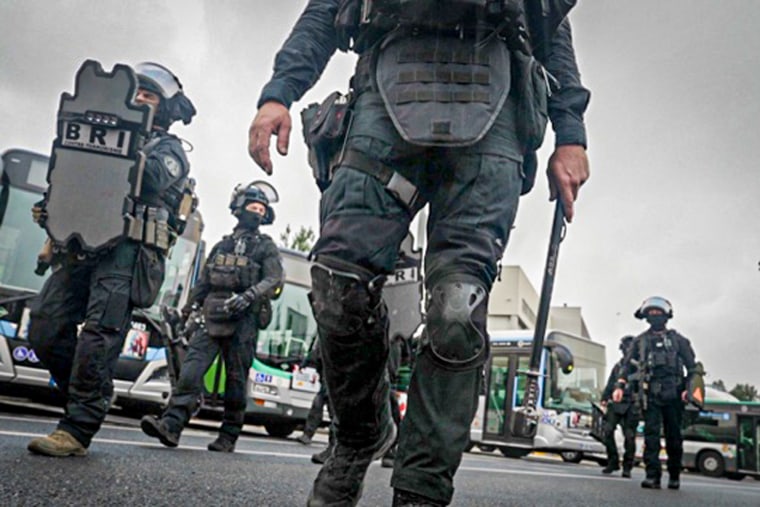PARIS — French President Emmanuel Macron and his government ministers have been relentlessly hitting the airwaves and speaking to reporters before Friday’s Olympic opening ceremony.
Their message is simple: France is ready to keep the Paris Olympics safe.
These Games will see the biggest security operation in French history, officials said, with 45,000 police officers and gendarmes on duty Friday and 35,000 working every day after during the competition.
Simon Riondet, chief of the Paris police’s elite Recherche et d’Intervention (BRI) unit, made an analogy to sports, saying his officers are ready to perform — even if they don’t know exactly when they’ll have to launch into action.
“That’s what we’re trying to do, be (ready) when we’re going to be needed,” Riondet told NBC News on Tuesday, moments after his team ran a drill to rescue hostages and kill a terrorist on a bus. “And it’s really hard because, contrary to the athletes, we don’t have a date.”
Interior Minister Gérald Darmanin told France 2 Television on Sunday that there were no specific threats against the opening ceremony, and confirmed it would go ahead as planned on the Seine.
A new intelligence analysis center, created for these Games, will act as a hub for information gained from various French law enforcement agencies.
Retired FBI agent Rob D’Amico, who worked on the 2002 Salt Lake City Olympics, said his best advice to the authorities in Paris would be to take any threat seriously, no matter how seemingly far-fetched.
“I talk about this with 9/11, we never thought that was going to happen — so when we saw intel about it, it was dismissed,” he said.

“So anytime something happens for the first time, it’s really tough to get the intelligence community to really pay a lot of attention to it because it’s never happened before.”
Friday’s opening ceremony will be the first of its kind held outside the confines of a stadium, bringing a unique set of security challenges. The 10,500-athlete, 90-boat flotilla will travel a 3½-mile route down the Seine through the middle of Paris.
A diplomatic Riondet said he didn’t mind having to prep for the unprecedented event.
“Of course, it’s an additional challenge,” he said. “We train frequently on the Seine and I know that it’s going to be very, very nice. If you have the chance to be on a boat, on the Seine, it’s quite tremendous, seeing all the buildings. The people will be able to see athletes in a way they’ve never experienced.”
The Olympics come to Paris almost nine years after coordinated terrorist attacks cost the lives of 130 people in the deadliest attack ever in peacetime France.

There have been about 50 terrorist attacks stopped by intelligence services since 2017, officials said.
Of the 45,000 law enforcement agents who will be on duty Friday, there will be 650 members of elite tactical units, snipers and hostage specialists. There’ll also be 22,000 private security contractors working during the opening ceremony Friday, officials said.
To enter any part of the control zone, whether its blocks away from an Olympic event venue or the Seine River, getting through checkpoints can take 20 to 30 minutes depending on traffic and time of day. Police check everyone’s credentials and match them with an ID.
Over 12-foot-high wooden planks are blocking off popular tourist sites like the Champs de Mars in front of the Eiffel Tower and the grounds by Les Invalides ahead of the games.
On Tuesday, there’s also a more visible military presence as the “Vigipirate” — the country’s counterterrorism unit — have begun patrolling the streets along with police and the Gendarmerie.

A security perimeter will prevent vehicles and most pedestrians from vast swaths of the city by the Seine, which cuts across Paris. Subway stations and bridges across the river will be closed.
French authorities carried out background checks on a million people linked to the Games, including job applicants, volunteers, competitors, coaches and staff, journalists and security contractors, leading to 4,350 identified as potential security threats, officials said.
“Nobody will be able to get accreditation from the organizing committee unless they have been screened,” said Julien Dufour, head of the Interior Ministry’s security screening service, SNEAS.
D’Amico, the retired FBI agent, said he doesn’t envy Paris security officials, running the Olympics during this fraught time in world history with nearby wars in the Middle East and Eastern Europe.
“Everyone is going to look at the Olympics to make a name for themselves and that’s why it is one of the biggest targets out there,” said D’Amico, who now runs a security consulting company in Florida.
So far, the only known plot against the Olympics was foiled back in May by France’s intelligence agency, the Direction Générale des Impôts (DGSI).
A Chechen man was arrested in Saint-Etienne and suspected of planning an attack on the city’s soccer stadium during a competition. The Islamic State Khorasan Province group, the Central Asian offshoot of the Islamic State terrorist group, was behind the plot, officials have said.
Protecting air space above the Games will be a top priority and Prime Minister Gabriel Attal visited a military air base Tuesday to inspect anti-drone systems.
About six drones are now being intercepted near Olympic sites every day, according to Attal.
A no-fly zone will be enforced up to 93 miles outside the center of Paris on Friday night.

“Nothing can be allowed to get past us,” Attal told reporters in Vélizy-Villacoublay, southwest of Paris. France’s military has prepared to deploy system that can detect, jam, and intercept drones.
Security will be high underwater as well, with 100 mine-clearing divers on duty.
“We are preparing for something that isn’t fully anticipated,” Riondet said. “So, we’ve anticipated thousands of scenarios and that we are ready to take over on a scenario that wasn’t expected.”
David K. Li reported from Paris and Jean-Nicholas Fievet reported from London.

إرسال تعليق